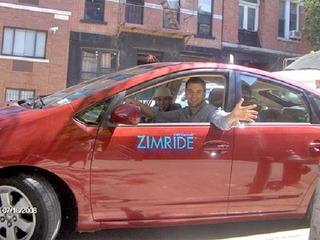
As much as the company insists that it is necessary, consumers really hate Uber’s surge pricing, in which it raises rates during peak periods, including holidays and inclement weather. Its just hard to not feel like you’re being taken advantage of, even if the reasons they give for it do make sense.
Now Lyft, which is one of Uber’s biggest competitors, is spearheading a new policy that basically the inverse of price surging; it will actually offer lower prices during off-peak times, it revealed in a blog post on Tuesday.
Called ‘Happy Hour,” the new program gives riders a discount of between 10% and 15% during the “slower times on the road.” Users will see the discounted prices as soon as they open the app.
“We created Happy Hour as a straightforward way to keep Lyft busier for drivers and more affordable for passengers,” Lyft said.
Uber’s justification for increasing prices during peak times has always been that they need to give those drivers a reason to choose them over a competing service by putting more money in their pocket. Now Lyft is using the same logic for Happy Hour as well, noting that a driver who might have only been able to give one $12 ride, might now have two or three $9 rides, which will obviously translate to a higher payday.
“With Happy Hour, Lyft’s prices are fully dynamic, which is the way it should be.”
The reason for price surging
As I said earlier, price surging has caused a lot of ire among Uber customers, as they feel as though the company is gouging them when it knows they will need a ride the most.
Travis Kalanick, Uber’s co-founder, has tried to explain, in two blog posts, why he feels the increased pricing is necessary during peak times.
“We raise price when supply of available cars gets tight,” he said. “We raise the price in increments over time based on supply health. When supply opens up, we then lower the price.”
The reason it is necessary is because raising the price gets more drivers out, which is more important during high demand periods like New Year’s Eve.
“Higher prices encourages more supply to come online. It gets some drivers out to work on NYE. It keeps other drivers from going to alternatives like renting their car out for the night, or trying their luck at hustling rides on the street,” he said. “Higher prices means more cars, means more rides, means more people getting around the city efficiently, safely AND in style.”
Essentially, the way Kalanick sees it, it is necessary to charge more to get more drivers to be willing to go out. From my perspective, this seems a little specious when talking about a time like New Year’s Eve, a night when every driver knows that there will be a lot of money to be made, no matter what the fare.
Kalanick, though, counters that by saying that drivers have plenty of options, so Uber needs to give them a reason to stick them.
“Drivers have alternatives to make a lot of money on this night, and if we do nothing, they’ll go elsewhere,” he said. “Our driver ops guys worked their butts off the week before NYE trying to get as many drivers as humanly possible to take the Uber bet on NYE—it’s a tough bet as one of their alternatives is selling their services for $1500 or more for the night.”
Perhaps Uber customers would feel a bit better about the policy if Uber adopted something like Happy Hour along with it, which might soften the blow of having to pay more at other times.


















